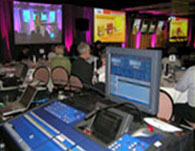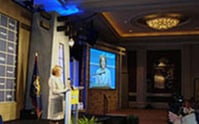 I've asked Susan Tarantino, an experienced Event Producer, to guest blog this month. In addition to her wit and her honesty, Susan brings the experience of dozens of wonderfully executed large events with her, and I believe you'll find her comments not only real, but helpful in event management! This is part 4 of a 9-part series on effective event management by our guest bloggers.
I've asked Susan Tarantino, an experienced Event Producer, to guest blog this month. In addition to her wit and her honesty, Susan brings the experience of dozens of wonderfully executed large events with her, and I believe you'll find her comments not only real, but helpful in event management! This is part 4 of a 9-part series on effective event management by our guest bloggers.
-David Haneke
Whether experienced or new at event production, everyone on the team has to be “speaking the same language.” With all the different software, computer systems and generations of professionals, you must be clear with your communications.Occasionally that reality smacks you when you least expect it. I’ve been producing corporate events for years but just recently experienced this truth once again.
 A week before a live event in which I was a team member, I realized that we had not all agreed on what software we would use for graphics, nor where the power for the video projection and audio would come from since there was limited power in the room; in addition, what time the prop pieces would be delivered and setup.
A week before a live event in which I was a team member, I realized that we had not all agreed on what software we would use for graphics, nor where the power for the video projection and audio would come from since there was limited power in the room; in addition, what time the prop pieces would be delivered and setup.
How does this happen? Assumptions. OOOooo! We all know what happens when we assume -- BUT when our first assumption is valid, we might be less likely to check our following assumptions. Here’s where disaster can move in: costly, stress producing disaster.
I said to myself: “Each committee member is a reputable expert; I’m sure they are handling what will happen when we set up on site. I don’t want to offend them by second guessing them.” The first assumption was absolutely correct. Yes, each member was a true expert. BUT we had never all worked together before.
My second assumption was wrong AND I should have followed my instincts. As a result, set up on site was a challenge.
While everything did get managed onsite, it became a stressful setup and compromises had to be made.
You should always voice your confusion and ask for clarification.
If you are the client working with a hired team, it’s your right to feel confident and clear. Even if you are not the client or a team leader, your instincts matter or they wouldn’t have chosen you to be on the committee.
This is why I am a big advocate of written communications, schedules, and with vendors - written contracts.
Secondly, know who you are talking to. The reality is that we have differing generations in the workforce today. Each generation has its strengths and I think we all gain from them. Yet we have to make sure we clearly communicate and listen to each other. Younger managers can be extremely quick information processors and extremely able to use new software with little instruction. Experienced specialists often know the "work arounds” and alternative methods which can come in very handy onsite when unexpected challenges arise. It’s just good management to use all the talent you have in your team but make sure they understand each other -- and you.
For a live event you should have one professional designated as Onsite Manager, responsible for where everyone will be and when they will be there. This person would also be able to look at the whole schedule and make sure the event will be setup in a timely, effective and cost-conscious manner. This should be done before you are onsite.
The bottom line is not just a successful event but also one which is on time with NO UNEXPECTED COSTS. That’s what I really want -- and I bet you do too.
Check that “language” early in the project and make sure that everyone is speaking the same language.
That will insure it’s the language of success!
Susan Tarantino
Tarantino Productions
 Want more on producing an incredible event and assembling the best team? Download the free White Paper which contains event management best practices.
Want more on producing an incredible event and assembling the best team? Download the free White Paper which contains event management best practices.
Part 3: Effective Messaging
Part 5: Hand-Picked Team


